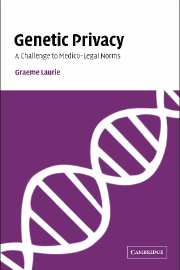Book contents
- Frontmatter
- Contents
- Preface
- Table of cases
- Table of legislation
- International instruments
- Miscellaneous documents
- 1 Health care, patient rights and privacy
- 2 Privacy: anti-social concept or fundamental right?
- 3 Human genetics and genetic privacy
- 4 Autonomy, confidentiality and privacy
- 5 Privacy and the public interest
- 6 Privacy and property?
- Index
1 - Health care, patient rights and privacy
Published online by Cambridge University Press: 25 June 2009
- Frontmatter
- Contents
- Preface
- Table of cases
- Table of legislation
- International instruments
- Miscellaneous documents
- 1 Health care, patient rights and privacy
- 2 Privacy: anti-social concept or fundamental right?
- 3 Human genetics and genetic privacy
- 4 Autonomy, confidentiality and privacy
- 5 Privacy and the public interest
- 6 Privacy and property?
- Index
Summary
Privacy as a problem
Privacy is a problem. Or rather, privacy causes problems. It causes problems for sociologists, psychologists, anthropologists, philosophers, politicians, doctors, lawyers, governments, states, communities, groups and individuals. The problems that it causes relate to its definition, its function, its nature, its utility, its value and its protection. The sheer extent of the difficulties is revealed by the length of the first few notes to this text.
One might wonder, as a result, what another text on privacy could meaningfully contribute to the debate. A first step to answering this question is to realise that the scope of privacy is so wide-ranging that no reasonable attempt can be made to analyse the concept in all of its facets and guises. This book examines the role of privacy in a health care setting. It considers patient privacy and the interface between medicine and law in the protection of individual rights as regards the provision of health care. In particular, the contribution of this work to the general debate about privacy lies in an examination of the privacy issues raised by what has been termed the New Genetics.
The advent of modern genetic science and genetic testing has given rise to acute problems in the health care context, some real and others imaginary. For example, the discovery of a predisposition to a genetic condition in one individual often also reveals potential risks to the blood relatives of that individual.
- Type
- Chapter
- Information
- Genetic PrivacyA Challenge to Medico-Legal Norms, pp. 1 - 27Publisher: Cambridge University PressPrint publication year: 2002



